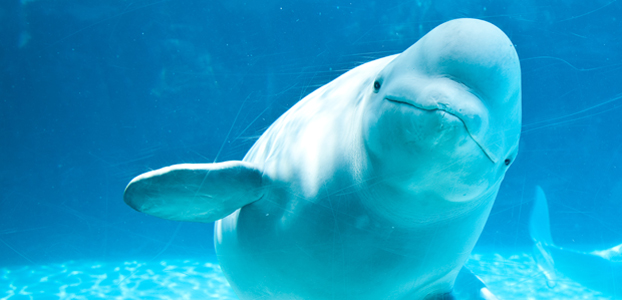Advertisement
Wildlife Wednesday: Beluga Whale
Habitat: Arctic and sub-Arctic waters Beluga trivia One of the most distinguishable characteristics of the beluga is the large, rounded “melon” (yes, that’s the proper name for it) on its forehead. The melon can actually change shape, so it looks like the beluga is making different facial expressions. Another defining characteristic is their white colour … Continued

Habitat: Arctic and sub-Arctic waters
Beluga trivia
- One of the most distinguishable characteristics of the beluga is the large, rounded “melon” (yes, that’s the proper name for it) on its forehead. The melon can actually change shape, so it looks like the beluga is making different facial expressions.
- Another defining characteristic is their white colour (even though babies are born grey or brown), thought to be helpful to blend in with Arctic ice. In fact, beluga means “the white one” in Russian.
- Like many other marine mammals, belugas are extremely social, hunting, migrating, and playing in groups called pods. Their migration route is to travel south when the Arctic ice gets too thick, and then return to the north when the ice is broken up again, although not all belugas migrate.
- The beluga is called the “canary of the sea” for its range of vocalizations, including whistles and chirps used to communicate with other belugas. Recently, it was found that belugas can even imitate human speech!
- Belugas can weigh up to 1.5 tonnes, or 3,500 pounds! Their thick layer of blubber helps them stay warm in the frigid Arctic waters. Even still, belugas are actually one of the smallest whale species.
- Their favourite foods are fish and shellfish such as shrimp, crabs, and mollusks. They are preyed upon by killer whales, polar bears, and Arctic people for food. Being one of the animals at the top of the Arctic food chain, they help the environment by keeping other population sizes in check.
Why they’re threatened
Belugas as a group are listed as near-threatened, with some populations endangered or threatened.
Specific threats include climate change (such as changes in Arctic ice); loud noise from ships and construction that hinders the beluga’s communication; collisions with ships; and oil spills. Oil and gas exploration and transport in the north is a main cause of many of these problems for belugas. Beluga whales have also been found to be contaminated with many harmful toxins from human activity.
To help belugas, support environmental and conservation causes and groups.





